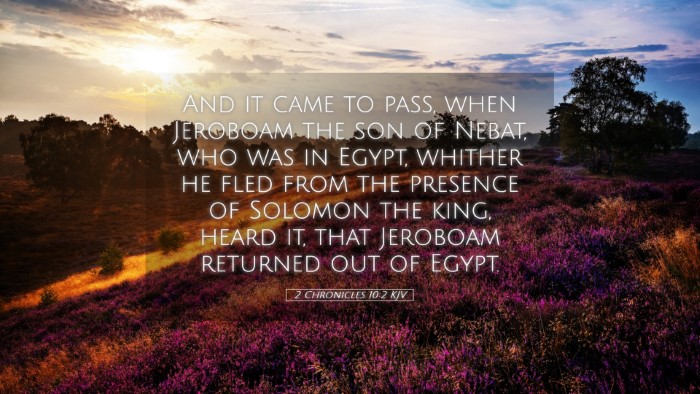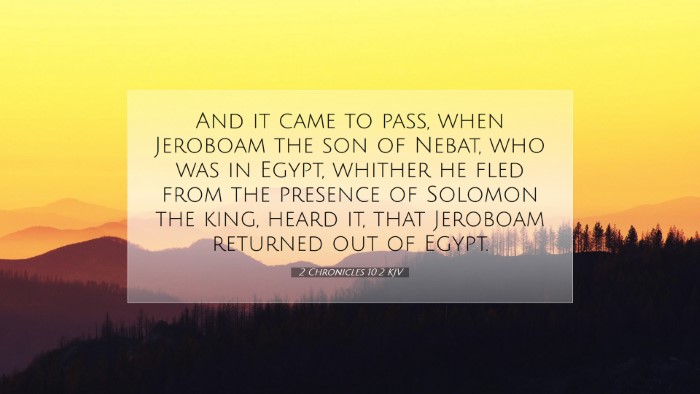Commentary on 2 Chronicles 10:2
Verse: "And it came to pass, when Jeroboam the son of Nebat heard it, that he returned out of Egypt." (2 Chronicles 10:2)
Introduction
This verse serves as a pivotal moment in the narrative of Israel’s history, highlighting the beginning of a significant divide in the kingdom. The return of Jeroboam, who was in exile in Egypt, is a critical turning point that sets the stage for the division of Israel into two kingdoms: the northern kingdom of Israel and the southern kingdom of Judah. This commentary synthesizes insights from renowned public domain sources to delve into the theological and historical implications of this event.
Contextual Background
Understanding the context is essential for grasping the significance of Jeroboam's return. Following Solomon's reign, the people of Israel were growing discontent with heavy taxation and forced labor. Rehoboam, Solomon's son, had succeeded his father and was faced with the decision to ease the burdens of the people. The counsel of elders was to lighten the yoke, but Rehoboam opted for the harsh advice of his peers, escalating the tension.
Historical Significance
Jeroboam had previously been a servant of Solomon, and the prophecy from Ahijah the prophet indicated that he was chosen by God to rule over ten tribes of Israel (1 Kings 11:29-39). Thus, his return from Egypt symbolizes not only reclaiming his role but also signals the onset of God’s judgment upon the house of David due to Rehoboam’s unwise decisions and the people's rebellious spirit.
Theological Insights
- Divine Sovereignty: Jeroboam's return illustrates God's control over human affairs. As Adam Clarke notes, the narrative highlights that even in times of civil strife, God’s purposes are being fulfilled.
- The Role of Leadership: The decisions and actions of Rehoboam serve as a cautionary tale about the seriousness of leadership and its impact on the welfare of the people. Matthew Henry emphasizes that poor leadership leads to division and unrest.
Jeroboam's Character and Preparation
Jeroboam is portrayed as a figure prepared by God for a significant role in Israel’s future. His time in Egypt might symbolize a period of readiness and reflection which models the concept of divine preparation for leadership. Albert Barnes comments that Jeroboam’s exile was perhaps a time of spiritual preparation, positioning him for the task ahead as he would lead a nation divided.
Application to Modern Believers
The events in 2 Chronicles 10:2 offer valuable lessons for contemporary believers and leaders:
- The Importance of Wise Counsel: Rehoboam's disregard for wisdom serves as a reminder of the necessity for leaders to seek and heed godly counsel.
- God's Purpose in Division: Sometimes, divisions occur in the faith community not as a sign of failure, but rather as part of God’s sovereign plan. This can encourage believers to trust in God’s higher purposes even when circumstances seem dire.
Conclusion
In summary, 2 Chronicles 10:2 encapsulates a moment of profound significance in the history of Israel. Jeroboam's return from Egypt is not merely a political maneuver but a fulfillment of God's promise and a demonstration of His sovereignty over the affairs of nations. As we reflect upon this verse, may we be reminded of the weight of leadership, the pursuit of wise counsel, and the trust we must place in God's overarching plan for our lives and communities.


